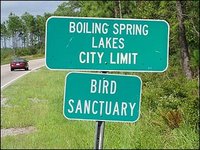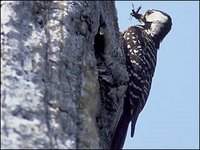 Here's a question for you: Why do you think the residents of Boiling Spring Lakes, North Carolina, have embarked on a wave of logging? "Since February," notes AOL News, "the city has issued 368 logging permits, a vast majority without accompanying building permits."
Here's a question for you: Why do you think the residents of Boiling Spring Lakes, North Carolina, have embarked on a wave of logging? "Since February," notes AOL News, "the city has issued 368 logging permits, a vast majority without accompanying building permits." The reason? The federal Fish and Wildlife Service issued an edict in February that all habitat supporting the red-cockaded woodpecker (pictured left) will be protected, and began issuing maps indicating which particular habitats are to be effectively nationalised by this protection -- property around Boiling Springs Lakes was a prime target, and those property-owners have been quick to move to protect what is theirs. Story here.
The reason? The federal Fish and Wildlife Service issued an edict in February that all habitat supporting the red-cockaded woodpecker (pictured left) will be protected, and began issuing maps indicating which particular habitats are to be effectively nationalised by this protection -- property around Boiling Springs Lakes was a prime target, and those property-owners have been quick to move to protect what is theirs. Story here.It's a result about which no-one is happy, (and just another result brought about by our old friend the Law of Unintended Consequences -- the law of human life and human affairs that "illuminates the perverse unanticipated effects of legislation and regulation").
The residents aren't happy, because they're losing the stands of trees that helped make the place a good place to live, but they're doing the only rational thing in the circumstances.
The lovers of the red-cockaded woodpecker (however many there might be) aren't happy because the habitat for their hero has diminished, but as yet they haven't paused to reconsider their scheme.
And presumably the red-cockaded woodpeckers previously resident in the trees around Boiling Springs Lake aren't happy either, but unlike their human defenders they'll never be able to understand why their homes have been cut down.
But it's all an entirely logical and predictable result of the federal Fish and Wildlife Service's authoritarian wildlife protection policy, and one long predicted by more enlightened wildlife advocates such as Australia's Graham Webb. Webb points out that if you want to protect wildlife for people who value them, then those who own the habitat in which the wildlife in question reside need to be able to extract some value from that fact. Conservationists need to recognise the property rights of those who host the wildlife they want protected.
As Webb said in the case of a rare variety of Australian cockatoos, if you simply declare them protected then every farmer who finds a red-tailed black cockatoo on his land is going to knock off the whole family before any wildlife agency gets a sniff, and the ownership over his land gets effectively removed. By contrast, if a value can be extracted from hosting these creatures (by farming for export perhaps, or selling tickets to come and visit them and learn about them) then the property-owner has an interest in protecting the habitat instead of destroying it.
If you want to protect wildlife, in short, you need to recognise the property rights that land owners have in their property, and look too to recognising a property right in wildlife. Eat them, skin them, and save them.
See here for Graham's discussion of this proposition that recognising a property right in animals makes for 'sustainable conservation':
...An increasing body of conservationists believe local people should not be treated as the enemy of conservation (Hutton and Dickson 2000). They should be active partners, at the frontline. To achieve and sustain this, they need to receive tangible, sustainable benefits for their efforts. In most cases, the only sustainable way of providing those benefits is through using wildlife for economic gain. That is, conservation through sustainable use (CSU).Graham's own crocodile park outside Darwin is a great example of one way this can work. The private conservation projects here in NZ and the various Southern African private wildlife parks are other good examples of private 'sustainable conservation' that succeeds by eschewing the idea of protecting non-existent 'intrinsic values' and instead by answering the question, "Of value to whom, and for what?"
In short, if you want to save wildlife, you need to be able to 'farm' the wildlife and recognise the property rights that inhere in them. The alternative is setting people against wildlife, and there's not only no need for that, it's counterproductive to both.
LINKS: Rare woodpecker sends town running for chain saws - AOL News
Crocodylus Park - Wildlife Management International
Conservation and sustainable use of wildlife - an evolving concept - Graham J. Webb, World Conservation Union [15-page PDF]
RELATED: Politics-US, Conservation, Property Rights, Environment
2 comments:
Reminds me of the case study on the "Queensland Vegetation Management Act" that Prof Suri Ratnipala presented at this years CIS liberty and society conference.
Why seek out examples in the USA?
We have our own home-grown fiascos
right here. Yes folks, starring none other than the Dear Leader. When Labour [under Lange] announced it's intention to "protect" the native bush on private land, it sank in to the owners that stealing private property was not the preserve of common criminals alone. In the lead-up to the Native Forests Amendment Act being drafted and passed [with Helen ramrodding the so-called 'consultations' through to the desired confiscation outcome], all you could hear were chainsaws. More native timber hit the deck in those 6 months than during the previous 6 years. The timber market was flooded. I tried to sell kahikatea on behalf of a neighbour. The Auckland boatbuilders laughed at me. They were being offered kauri in quantity at give-away prices by northland landowners. Had the deluded minister a passing knowledge of human behaviour, there would be thousands of trees still gracing the land today, being used as intermittently as their owners required, or more likely just being looked at. But no, we must have doctrinal purity and the forest must be saved. Net results? Stumps; but they won votes. Guess who for? Nobody on the West Coast has any doubts about the integrity of that government, there was none. They broke accords and promises like pretzels, with no loss of sleep.
Post a Comment